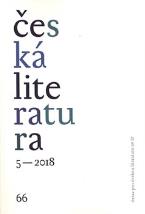Řeč není jen k mluvení
Speech is not just for speaking
Surveys of diachronic poetics and the theory of narrative modes
Author(s): Alice Jedličková, Jiří KotenSubject(s): Czech Literature
Published by: AV ČR - Akademie věd České republiky - Ústav pro českou literaturu
Keywords: diachronic narratology; narrative modes; narrator’s commentary; character discourse; direct discourse; free indirect discourse; representation of characters’ minds; psycho-narration; interior monologu
Summary/Abstract: The material for this study is a selection from diachronic research into narrative modes in 19th century Czech prose. Surveys of the narrative poetics of three authors (those of František Pravda, Karolina Světlá and Teréza Nováková) illustrate this exposition of the changing face of free indirect discourse usage from the mid-19th century. At the same time it demonstrates that diachronic analyses often require us to review previous conceptualizations of narrative features and theories of their development. Hence the first part comprises typical ways in which free indirect speech is used in Pravda’s short stories in the light of Doležel’s theory on its emergence. Here free indirect speech is explained within the framework of the Modernist transformation of narrative as one of the manifestations of the subjectivization of narrative, based on the integration of a character’s speech within the narrator’s speech zone. The function of free indirect speech in Pravda’s case is primarily to consolidate the position of the narrator. In Karolina Světlá’s narrative, free indirect speech assumes a double function: as a device for portraying an individual’s mind it plays the role of subjectivizing narrative, while as one of the devices used to create the relationship between the narrator and the world of the story it can express the fact that the narrator has adopted the standards and conventions within that world and shares them with the characters, thus neutralizing the subjective-objective dichotomy. The work of Teréza Nováková shows an increasingly sophisticated selective application of free indirect speech, both in its subjectivizing role (which is thematically limited and thus a fundamentally semanticizing depiction of the character’s mental processes) and its objectivizing role, namely in its depiction of „public opinion“. This transposition of the „passingspeech record“ becomes independent in discourse, which to a large extent suppresses the mediated nature of the narrative and thus focuses on its objectivization. Free indirect speech can thus hardly be explained merely as a phenomenon associated with the modernist subjectivization of narrative. Diachronic surveys documenting its use on a scale from rhetorization (Pravda) to the objectivization of narrative (Nováková) indicate that it is much more likely to be the result of the ongoing proliferation of opportunities for the narrative transposition of speech.
Journal: Česká literatura
- Issue Year: 66/2018
- Issue No: 5
- Page Range: 623-660
- Page Count: 38
- Language: Czech

